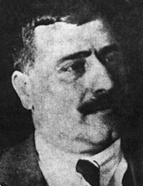

Born into a humble family, Rocha Martins was self-taught and went on to become one of the most widely published Portuguese writers of all time. He attended the Curso Superior de Letras [a higher education institution focused on History, Philosophy and Literary Studies], but did not complete his studies. A journalist and novelist, his works often featured historical themes (Maria da Fonte, Madre Paula, Bocage, Gomes Freire, among others). He was also a promoter of historical subjects, which he referred to as historical evocations. These appeared in books, in the newspapers ABC and National Archive — both of which he founded and directed — and in numerous pamphlets, forming collections that reached large print runs. A corresponding member of the Academia das Ciências de Lisboa [Lisbon Academy of Sciences], he also had a deep interest in literature, dedicating some noteworthy works to Camilo Castelo Branco and Eça de Queirós. In all of his writings, a distinctly romantic perspective is evident — he seemed particularly fond of drama. However, a few titles stand out from his vast bibliography, in which he genuinely sought to write what is considered contemporary history. He was always engaged in politics, especially in causes that benefited a liberal monarchist perspective. Despite being a staunch supporter of João Franco, he defended the dictator Pimenta de Castro and later aligned himself with Sidónio Paes, even serving as a member of parliament during Paes' administration. As a councillor in the Lisbon municipality in 1924, he initially collaborated in the propaganda of the Estado Novo [New State]. However, he later became a prominent opponent of Salazarism, particularly in the 1940s, through articles in the newspaper República, which caused a significant stir. His relationship with the newspaper's director, Carvalhão Duarte, was likely linked to their shared Freemasonry ties. As a monarchist, it is unsurprising that he claimed to be a liberal, though he always placed his country above the broad freedoms he advocated. As a liberal, he was an "open and firm opponent of red and white Jacobinisms...” (O governo [The government]..., 1945, 9). It was therefore natural for him to collaborate with Lopes d'Oliveira (a liberal, radical republican, and patriot) on the writing of the "Cadernos Históricos" [Historical Notebooks], which were published in Lisbon in 1946 for the purpose of popular education. This cultural dissemination effort gathered contributions from Aquilino Ribeiro, João de Barros, and Bourbon e Meneses. In many ways, it revived the intentions behind the so-called democratic propaganda publications of the late 19th century (1887–1888) by Zófimo Consiglieri Pedroso. Written in a simple style to be accessible to the general public, the Cadernos aimed to show the history of the humble and their rise, made possible by democracy.
This work is financed by national funds through FCT - Foundation for Science and Technology, I.P, in the scope of the projects UIDB/04311/2020 and UIDP/04311/2020.
